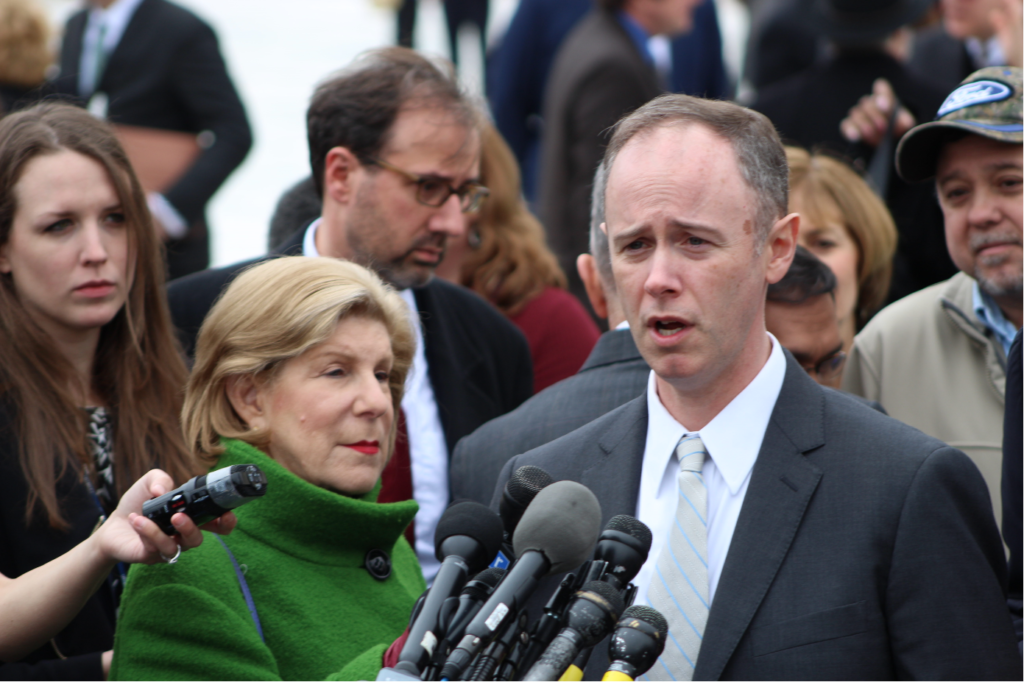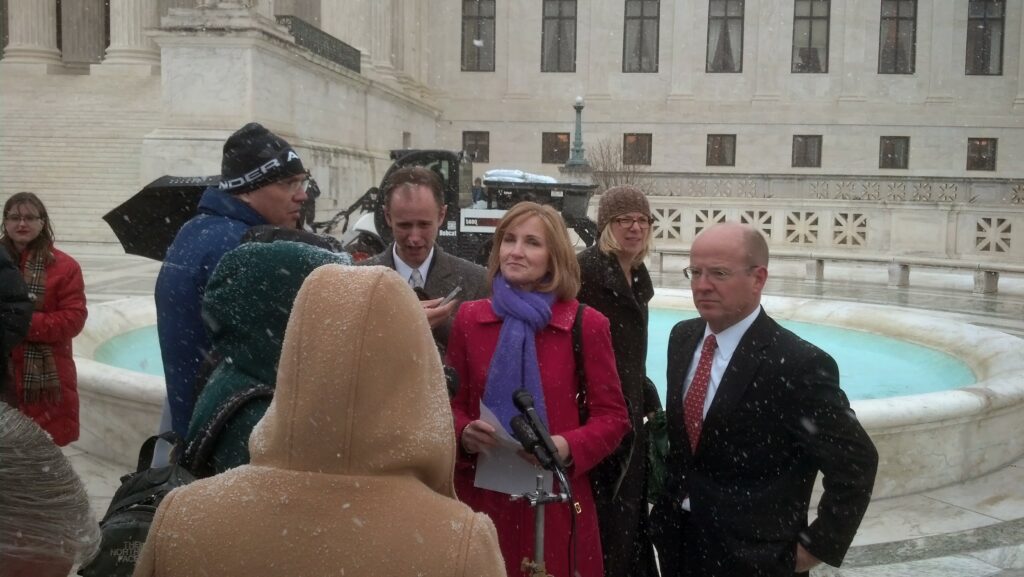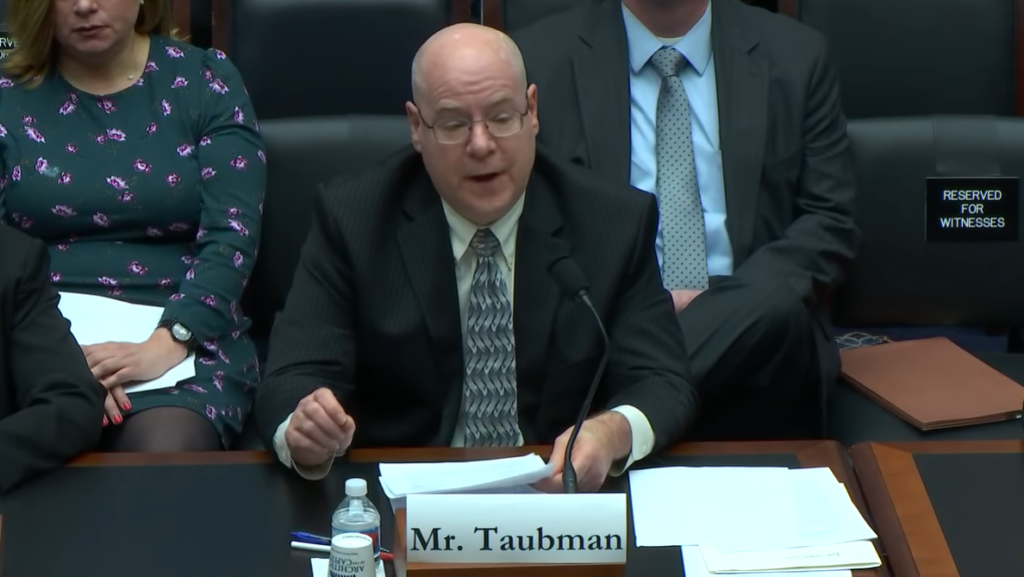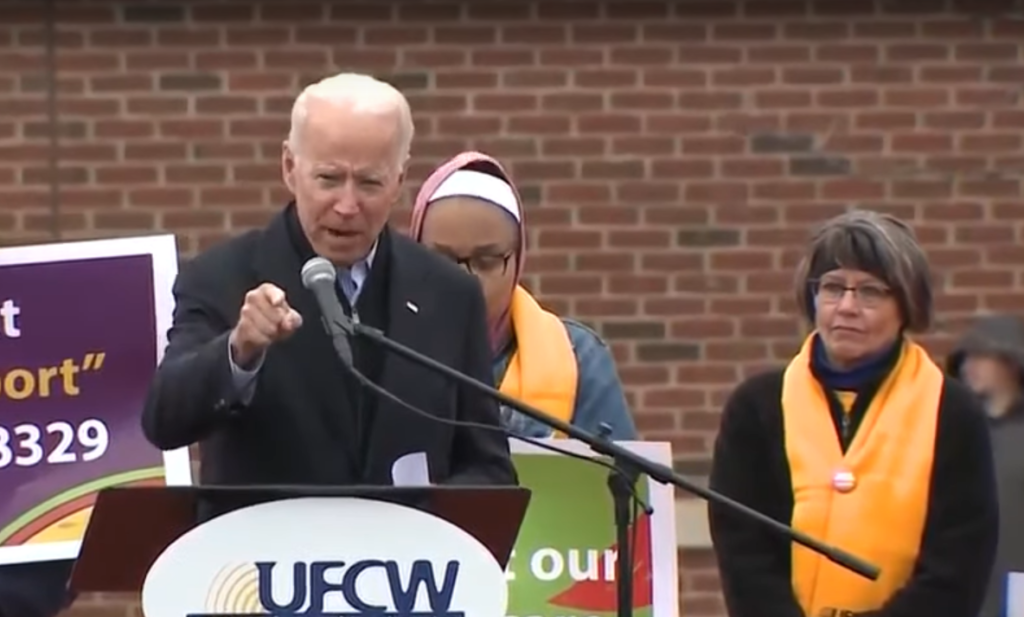Labor Day Media Round Up: National Right to Work Commentaries Highlight Injustices of Forced Unionism
On Labor Day, the National Right to Work Foundation generated significant coverage in both national and local media outlets, especially on newspaper opinion pages. Foundation President Mark Mix wrote a number of pieces for outlets around the country highlighting the injustices of compulsory unionism and what can be done to protect workers freedom.
Mix wrote for USA Today that no American should be forced to pay union dues just to get or keep a job and highlighted the prevalence of compulsory unionism despite Right to Work laws gaining ground:
Twenty-seven states have now enacted and implemented right-to-work laws, with five joining in the last eight years.
And on June 27 of last year, the U.S Supreme Court handed down one of the most significant employee rights legal victories in the history of the right-to-work movement with the Janus decision, which ended the forced payment of union dues or fees for millions of government workers nationwide.
Unfortunately, there are more private sector American workers in the 23 non-right-to-work states and others in the railway and airline industries who still work under compulsory unionism.
Mix also wrote a column for the Detroit News arguing that no worker should ever have to fear union violence just because they disagree with union tactics or thuggish strong-arming:
Violence, the threat of violence and the wrongful non-violent use of fear and intimidation by union thugs should be illegal. No exceptions.
The spreading UAW corruption scandal shows that union bosses often act as though they are above the law.
For the Lexington Herald-Leader, Mix wrote about how Kentucky’s Right to Work law benefits the state, and why they need to protect it from the attacks of Democrat and gubernatorial candidate Attorney General Andy Beshear, who wants to give power back to union bosses should he be elected to replace Governor Matt Bevin a friend of Right to Work:
Beshear wants to return the Commonwealth of Kentucky to the days of workers being forced to hand over a portion of their hard-earned paychecks to the union boss elites to get or keep a job. Meanwhile, the Bevin Administration has spearheaded record economic growth after passing Right to Work here in Kentucky.
Even putting that enormous economic growth aside, the fact is that one candidate favors allowing Big Labor to extract money from workers’ paychecks, and the other candidate has worked tirelessly to protect Kentucky workers’ right to hold onto their paychecks without union boss interference.
And for the Las Vegas Review-Journal, Mark wrote how Right to Work laws have benefitted Nevada’s workers and families for more than half a century, causing noticeable effects for the state’s economy:
There is a reason Tesla’s Gigafactory is located in Nevada and not California. A nationwide 2017 survey of business leaders conducted by Chief Executive magazine found that, by a 2-to-1 margin, CEOs prefer adding jobs in right-to-work states over other states.
Business owners correctly view states that have passed right-to-work laws as being more welcoming and business-friendly than high-tax, forced-dues states such as California. That is why federal Bureau of Labor Statistics data show that from 2013-18, factory employment growth in Nevada was more than three times greater than in Western forced-union states such as Colorado, Oregon and Montana.
Just a few days after Labor Day, the Daily Caller published a timely op-ed from Mix regarding the Trump Administration’s rules to make it harder for union officials, like those implicated in the unfolding UAW scandal, to spend worker’s money on themselves or fuel their corruption:
At the end of May, the Trump Labor Department unveiled a rule that, as a contemporaneous news account filed by the Law360 legal news service explained, imposes “financial disclosure requirements for certain trusts that unions set up, scrutiny the agency says will ‘deter fraud and corruption.”
The proposed rule would reestablish the Form T-1, which until it was scuttled by union-label Obama administration bureaucrats in 2010 blocked officers of unions with $250,000 or more in annual revenue from using trusts supposedly created to benefit rank-and-file members to circumvent the federal reporting requirements for such unions that Congress instituted in the Labor-Management Reporting and Disclosure Act.
In addition, Mix wrote two op-eds, one for Right to Work states and the other for non-Right to Work states, which were sent out across the country and printed in local newspapers. They highlight the benefits of Right to Work laws and the problems that forced unionism causes.
Labor Board Rules UAW Violated Ford Worker’s Legal Rights by Unlawfully Accepting Union Dues Deducted from Paycheck
NLRB orders union officials to reimburse funds seized after employee resigned his union membership and revoked authorization to deduct any further dues
Washington, D.C. (September 4, 2019) – Ford Motor Company employee Lloyd Stoner won an important legal victory at the National Labor Relations Board (NLRB) with free litigation aid from National Right to Work Legal Defense Foundation staff attorneys after union officials violated his legal rights.
An NLRB three-member panel unanimously affirmed a ruling by an administrative law judge that United Automobile Workers (UAW) Local 600 union officials violated Stoner’s rights under the National Labor Relations Act (NLRA). The NLRB ordered the Dearborn, Michigan-based union local officials to reimburse Stoner for union dues unlawfully deducted from his paycheck after he attempt to exercise his legal right to revoke his dues checkoff authorization.
Administrative Law Judge Michael A. Rosas ruled in February that UAW Local 600 engaged in unfair labor practices under the NLRA by accepting union dues deducted from Stoner’s wages for two-and-a-half months after he resigned union membership and revoked his authorization to deduct dues. The union also failed to refund any of the dues taken without Stoner’s consent for nearly five months after his revocation.
Stoner had already won a favorable settlement in January from the Ford Motor Company, which was charged for deducting the unauthorized dues from his paycheck.
In addition to refunding dues unlawfully deducted from Stoner’s paycheck, the NLRB ordered union officials to honor any requests of employees to resign from membership and revoke their dues checkoff authorizations. UAW union officials must refrain from coercing workers from exercising their rights under the National Labor Relations Act (NLRA), the Board added.
“By standing up for his rights, Lloyd Stoner has won a clear victory for himself and his colleagues against abusive union practices,” said National Right to Work Foundation President Mark Mix. “The Board is absolutely right that union bosses cannot keep accepting money deducted from a worker’s paycheck even after an employee resigns his union membership and tells the union he no longer wishes to pay dues.”
“It is outrageous that union officials thought they could get away with an obvious violation of the National Labor Relations Act,” Mix added. “Scandal ridden UAW bosses may claim to represent rank-and-file workers, but their actions repeatedly show they are really just out for power and money.”
National Right to Work Foundation Issues Special Legal Notice for California Workers Impacted by Possible UFCW Union Boss Strike
Foundation staff attorneys recently assisted workers whose rights were violated by UFCW officials during high profile Stop & Shop Strike
Washington DC (September 5, 2019) – Today the National Right to Work Legal Defense Foundation issued a special legal notice for workers affected by a potential strike at several grocery chains in central and southern California called for by United Food and Commercial Workers (UFCW) union officials.
According to news reports, the UFCW threatens to strike against Albertsons, Vons, Pavilions and Ralphs grocery stores, impacting over 45,000 employees. The special legal notice informs these affected workers of the rights union officials won’t tell them, including that they have the right to continue to work to support their families despite the union boss-ordered strike.
“The situation raises serious concerns for employees at potentially affected stores who believe there is much to lose from a union-ordered strike,” the legal notice reads. “Which is why workers frequently contact the Foundation to learn how they can avoid fines and other vicious union discipline for continuing to report to work to support themselves and their families.”
The National Right to Work Foundation’s special legal notice informs workers of their right to continue to work at their job during union-demanded strikes. It also highlights workers’ rights to resign union membership and their rights to revoke their union dues check-offs which take money from their paychecks. The notice also provides helpful information for removing an unaccountable union from a workplace, including how to use a decertification petition to obtain a secret ballot election to do so.
Importantly, the notice gives workers who want to exercise their right to work information on how to avoid fines and punishment from union officials. The National Right to Work Foundation is the nation’s premier organization exclusively dedicated to providing free legal assistance to employee victims of forced unionism abuse.
The full notice can be found at https://www.nrtw.org/ufcw-ca/
Foundation staff attorneys assisted several grocery workers during and after a recent UFCW-initiated strike in New England against the Stop & Shop grocery chain. Two workers have already filed federal unfair labor practice charges against the union for illegal conduct by UFCW union officials.
“Workers always have the right to continue to work during a strike, despite what union bosses may tell them or try to pressure them into,” National Right to Work Foundation President Mark Mix said. “This legal notice reflects the Foundation’s decades-long commitment to offering free legal aid to workers to protect themselves from union bosses’ coercive tactics which regularly go hand-in-hand with union strike demands.”
Full Foundation Action July/August 2019 Newsletter Now Online
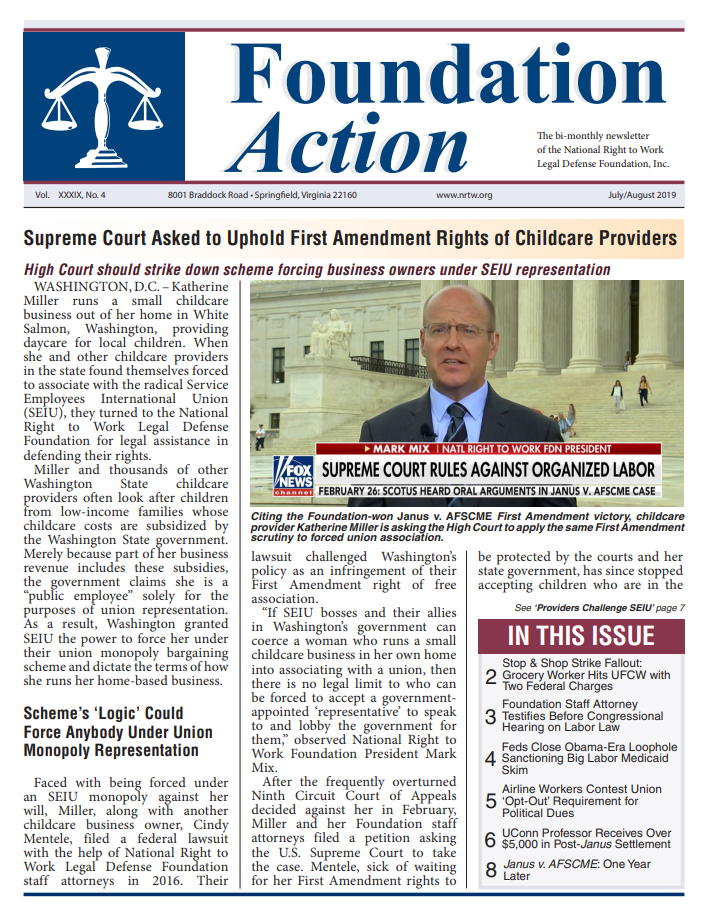
In this issue:
- Supreme Court Asked to Uphold First Amendment Rights of Childcare Providers
- Stop & Shop Strike Fallout: Grocery Worker Hits UFCW with Two Federal Charges
- Foundation Staff Attorney Testifies Before Congressional Hearing on Labor Law
- Feds Close Obama-Era Loophole Sanctioning Big Labor Medicaid Skim
- Airline Workers Contest Union ‘Opt-Out’ Requirement for Political Dues
- UConn Professor Receives Over $5,000 in Post-Janus Settlement
To view other editions or sign up for a free copy of the newsletter via mail, click here.
National Right to Work President Urges Voluntary, Not Coercive Unionism on Labor Day 2019
“America must do more to protect the dignity of every American worker against the injustices of compulsory unionism.”
Washington, DC (Aug 29, 2019) – Mark Mix, president of the National Right to Work Legal Defense Foundation and the National Right to Work Committee, issued the following statement on the occasion of Labor Day 2019:
On this Labor Day, many American workers are enjoying a well-deserved extra day of rest and relaxation with their families. And while we should celebrate all they do for this nation, we must also recognize that even as we make advances, America must do more to protect the dignity of every American worker against the injustices of compulsory unionism.
When it comes to freedom versus compulsion in the workplace, Samuel Gompers, founder of the AFL-CIO union, said it best: “I want to urge devotion to the fundamentals of human liberty – the principles of voluntarism. No lasting gain has ever come from compulsion.” And where Gompers’ advice has been followed and voluntarism reinforced, workers and economic opportunity have flourished.
The United States Supreme Court’s decision last year in Janus v. AFSCME, won and argued by National Right to Work Foundation staff attorneys, secured the First Amendment rights of millions of public sector workers to choose individually whether or not union bosses deserve their financial support. Similarly, state Right to Work laws in place in 27 states protect millions of private sector workers from being fired simply for refusing to pay tribute to union officials.
Yet every day, millions of Americans are still forced to subsidize union boss activities or else lose their job. Meanwhile millions more are forced to accept forced union representation even when they oppose such representation and believe they would be better off without it.
Now, as the 2020 election looms, the American people are presented with two starkly different visions for the freedoms of America’s workers. The National Right to Work Act, currently pending in Congress would build on the Janus decision and state Right to Work laws by expanding workers’ freedom to decide the whether or not to join and financially support a labor union.
Meanwhile, Big Labor is wielding a multi-billion dollar forced dues-funded political war chest to expand union coercion over rank-and-file workers. Their top priority, the so-called ‘PRO Act,’ would expand union boss power to force workers into their ranks and also wipe out every state Right to Work law to give union officials the power to have millions of additional workers fired for not paying union dues or fees.
While that expanded regime of workplace compulsion may appeal to union bosses and the politicians whose campaigns are backed by Big Labor’s political machine, fortunately it is completely out of step with rank-and-file workers and the American people who overwhelmingly back the Right to Work principle that union membership and financial support should be strictly voluntary.
So this Labor Day, we should take Gompers’ words to heart and be on guard for attempts to undermine workers’ individual freedoms. And we should honor American workers by trusting each one to decide for him or herself whether or not to affiliate with a labor union.
Ohio Public Employees File Lawsuit Against AFSCME Union, State of Ohio Challenging Unconstitutional Restrictions on Stopping Union Dues
Class action lawsuit names Governor DeWine for state’s role in enforcing opt-out requirement that violates U.S. Supreme Court’s Janus v. AFSCME precedent
Columbus, OH (August 27, 2019) – National Right to Work Legal Defense Foundation staff attorneys have just filed a class action lawsuit in the U.S. District Court for the Southern District of Ohio, challenging the State of Ohio’s enforcement of illegal restrictions created by AFSCME Council 11 union officials to limit state employees’ First Amendment rights to stop union dues payments. The lawsuit is being filed for five state employees who are receiving free legal aid from the Foundation.
The complaint seeks to ensure that Ohio state workers can freely exercise their constitutional rights under the Foundation-won Janus v. AFSCME U.S. Supreme Court decision, which struck down mandatory union fees as a violation of the First Amendment rights of government employees. The Supreme Court recognized that any dues taken without a government worker’s affirmative consent violate the First Amendment, and further made it clear that these rights cannot be restricted absent a clear and knowing waiver of them.
The lawsuit challenges union-created restrictions which block workers from exercising their rights under Janus outside of a brief “escape period” once every three years at the expiration of the union monopoly bargaining contract. AFSCME Council 11 is enforcing such First Amendment restrictions against tens of thousands of state workers.
The lawsuit seeks to end those restrictions and ensure that state workers only have union dues deducted from their paychecks if they have affirmatively opted-in to such payments. Because the state is seizing the dues from workers’ paychecks and enforcing the restriction, Governor DeWine and another state official are named as defendants in the complaint.
“Over a year ago the US Supreme Court ruled that public employees’ financial support of union activities must be completely voluntary, but the state of Ohio continues to enforce illegal union policies that violate the clear standards laid out in the Janus decision,” said National Right to Work Foundation President Mark Mix. “Governor DeWine and Attorney General Yost should move quickly to stop this widespread violation of the First Amendment rights of Ohio public sector workers and cease collecting union dues from any worker who has not affirmatively consented to pay dues.”
The Ohio government employees’ lead Foundation staff attorney is William Messenger, who argued the Janus v. AFSCME case at the U.S. Supreme Court. Foundation staff attorneys are currently litigating dozens of cases to enforce the Janus decision for workers from coast-to-coast.

